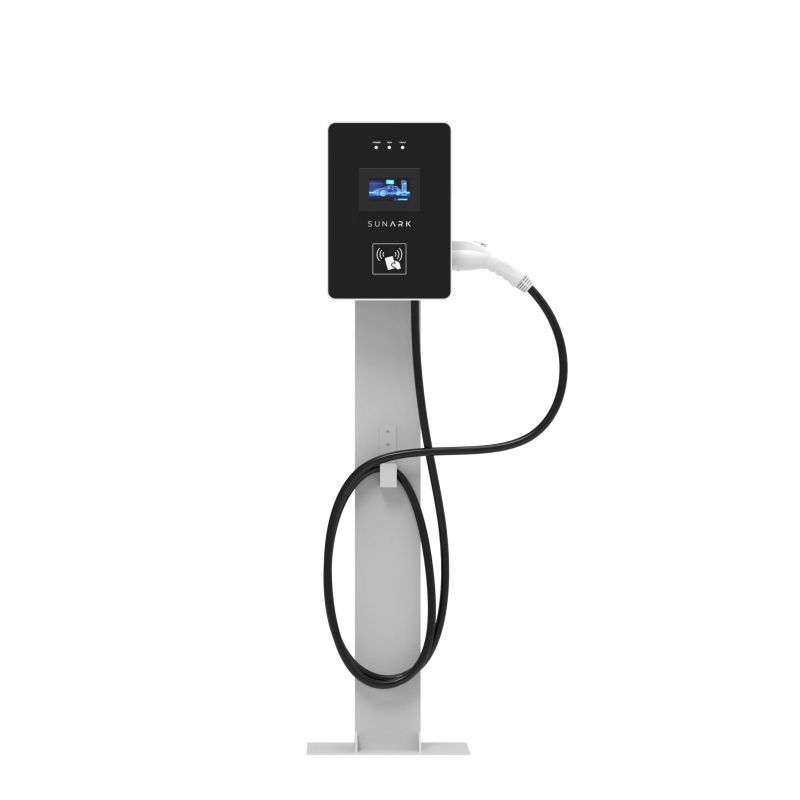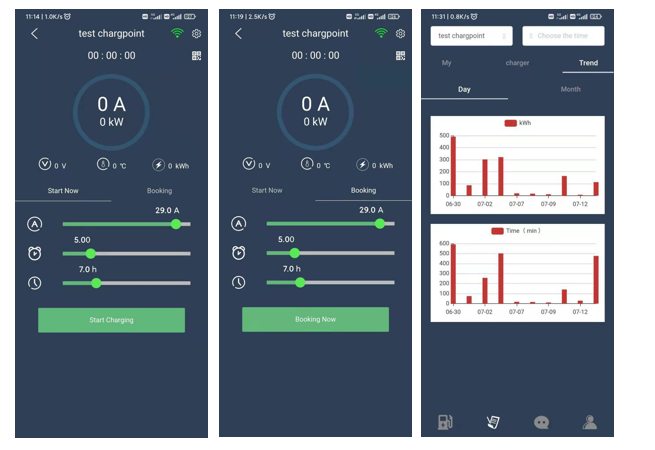At its most basic, an EV charger pulls an electrical current from either a 240v outlet or the grid it's hardwired to and delivers that electricity to the vehicle, just like any other appliance or device you charge by plugging into the wall.
Standard:
SAE Standard / IEC StandardConnector type:
Type 1 / Type 2Connector Mechanical Operating Life:
≥10000 times
What are the benefits of using a home EV charger?
So how does a dedicated home EV charger help with these issues? The three main benefits are increased charging speed, better safety, and more flexibility. Let's take a deeper look.
Higher charging speeds
Because it has a dedicated connection to the meter box, a home EV charger can deliver much greater power to an EV, which, in turn, translates to faster charging. While charging speed varies on a range of factors, a home EV charger will be at least 3 times faster than charging via a regular outlet and can be up to 5 or even 15 times quicker with higher-powered models.
Better safety
Another important benefit of a home EV charger is its safety. Because EV charging is a highly-energy intensive activity, it can quickly put too much strain on your home’s electrical circuit and cause a power overload if not managed properly.
And charging using unsuitable equipment is more common than you think: nearly 3 out of 4 EV drivers in the UK admitted to regularly using extension cords to charge their cars, which can pose a fire hazard and be especially dangerous when used outdoors.
A home EV charger mitigates this by having a dedicated connection from your meter box, enabling it to safely draw higher loads without tripping your breakers or overwhelming your circuit. Next to this, home charging stations are designed to operate outdoors and can withstand the elements without posing a safety hazard for the user.
Greater flexibility
Finally, a home EV charger also unlocks greater flexibility, for example by having built-in connectivity. This allows drivers to manage and control charging sessions remotely – often from a smartphone app – and gain insights into charging on aspects such as energy use and charging costs.
A connected home charger can often also receive automatic software updates, which can remotely add new (smart charging) features, fix bugs, and allow remote troubleshooting.

How much does a home car charging station cost?
While the cost of an EV charger varies greatly, generally speaking, the average price nowadays ranges between €670 and €1,600. With a difference of nearly €1,000.- in that estimation, you might be wondering where this price difference comes from.
One crucial factor is whether the installation is included in the price or not. This can account for a large part of the variation and can often add a significant cost if it isn’t included in the initial price.
Other than installation, the features and capabilities of a home EV charger are the main reasons for the price difference. These include the desired charging speed, connectivity, potential smart functionalities, and whether it has a built-in charging cable.

How long does it take to charge with a home EV charger
?
The time it takes to charge an EV at home varies based on a range of factors, such as the power output, battery size, and driving behavior to name a few. However, on average, it takes between 3 and 10 hours to charge up an EV with a 66 kWh battery – the average EV battery capacity at the time of writing.

What determines EV charging times at home?
Let’s have a look at some of the factors that impact that wide time range.
Power output
One of the main factors that will determine how fast you can charge your car is your home EV charger’s power output. As a rule of thumb, the higher the power output, the more power a charger can deliver to your EV’s battery and the faster it can charge.
Home chargers most commonly have a power output of 7.4 or 11 kilowatts (kW), although some more powerful 22 kW ones are also available, depending on your home’s circuit and the national electricity grid.
As we’ll see later, it’s worth keeping in mind that other factors, such as your car’s charging capacity, can limit the power output you can use, so simply installing the charger with the highest output may not always be the best solution.
An EV charger connected to an electric car and a hologram showing detailed insights of the charging session.
Battery size
Another crucial factor that influences how long your EV will need to charge is its battery size. While it may seem obvious, the smaller your EV’s battery, the faster it will charge up, and vice-versa.
EV batteries come in a wide range of capacities – all the way from the Smart EQ fortwo’s 16.7 kWh battery to the Lucid Air Dream Edition’s 118 kWh. To put that into perspective, the Smart would charge up to 80 percent in under an hour and a half using a 7.4 kW home charger, while the Lucid would take over 10 and a half hours to achieve the same level of charge.
Of course, the Lucid will take you further before needing a recharge.
State of charge
Speaking of battery percentage, this is referred to in the industry as “state of charge” or “SoC” and is also an important determinant of how long an EV takes to charge. Battery chemistry makes it so that an EV with a low state of charge – say, 20 percent – will be able to accept a much higher power output than one that has a high state of charge.
The graph below illustrates this phenomenon: a home EV charger progressively decreases its power output as the battery gets closer to full. This is why charging a car up from 80 to 100 percent takes much longer than, for instance, charging from 40 to 60 percent.
FAQs:
Q1: Do you support OEM/ODM?
A:Definitely, OEM&ODM service is supported with a certain quantity,including customize logo,package and label;
Q2: What's the production time?
A: The production time is normally 15 working days. but we will always prepare some stocks for popular models.
Q3: Can you provide DDP service?
A:Yes, if you are a personal customer and don't want to deal with the customs, we can provide DDP service to your address.
Q4: What about the warranty and how to claim?
A: Warranty period are 5 years since you receive the product, our professional after-sales team will deal with all warranty issues.